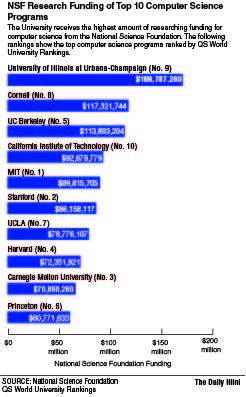University ranked No. 1 in computer science research funding by National Science Foundation

March 18, 2015
The National Science Foundation ranked the University No. 1 in research funding for computer science in fiscal year 2014, ahead of many other academically higher ranked computer science programs, such as at those at Harvard University and Stanford University.
Leading with roughly $170 million in funding, the University has consistently appeared as NSF’s top-funded CS program in the country since 2010.
According to the QS World University 2014 rankings, the University is also among the top 10 Computer Science programs in the nation, ranked at No. 9.
Rob Rutenbar, department head of Computer Science, said the NSF’s ranking shows the University is successful in raising funds for larger research divisions, and noted particular advantages of the University’s program.
“We’re kind of a big department with almost 60 faculty, which puts us on the way higher end of size for a computer science department,” Rutenbar said. “But we’ve also been successful in having some of our faculty have foundational or leadership roles in some really big project-kinds of efforts.”
Get The Daily Illini in your inbox!
Rutenbar cited several examples, including the University’s contract with Blue Waters, the super-computer platform run by the National Center for Supercomputing Applications.
William Kramer, research professor in computer science and director of the Blue Waters Project, said the University also has 50 years of history and accomplishments that prove it a more “robust” program than other leading computer science programs.
“(Faculty members) typically are attracting work both from government funders and from industrial partnerships, that is much bigger in vision and goal,” Kramer said. “If you look at the people who graduated from Illinois, they have made very notable careers, accomplishments, businesses and startups in the computing industry, as well as in public service.”
A number of companies developed at the University include: YouTube, PayPal, Yelp, Match.com and Mosaic, which was later developed into Netscape Navigator.
Mosaic is known for popularizing the World Wide Web.
“Mosaic was accomplished by a CS student, an undergraduate that was doing research and was funded by the NCSA, as well as a CS (graduate) student,” Kramer said. “That type of innovation is particularly innovation on a large scale; it’s not found many other places, if any.”
Kramer clarified the internet was in place 20 years before browsers were, and it was the use of the internet browser that was invented on campus, not the internet.
“What browsers enabled was making it extremely easy to find information and to display information and allow better levels of interactivity, that also then launched the commercial use of the internet,” Kramer said.
Rutenbar said the size of the program is what makes it “perhaps the most entrepreneurially robust school in the country.” He believes the success of the program accounts for it having a high tuition compared to other public schools.
“We have these great connections to people who are funding new startups, who are mentoring people who want to do new startups, and who are willing to give people advice and make connections with people,” Rutenbar said.
As a former professor at Carnegie Mellon University, who ranked No. 3 in the QS World University 2014 ranking for American schools, Rutenbar said some of the peer CS programs have the luxury of being in Silicon Valley, which has “the most remarkable culture of startups and entrepreneurship of any place on the planet.” Despite its location, Rutenbar believes the University is still competitive.
David Desberg, freshman in computer science, said the University was one of his top choices due to the size of the department, as well as the various opportunities available at the University.
“I think with the size, we have some really brilliant professors doing research in a number of different areas, because there’s so much funding,” Desberg said.
Desberg added that smaller private universities allow more engagement and more personal relationships with professors, which can also be achieved at the University with greater effort.
“With a place like us, because we’re large and also growing, we have doubled the size of the undergraduate class over the last seven years, and there’s a reasonable shot of getting in here and being a part of this phenomenal institution,” Rutenbar said.






